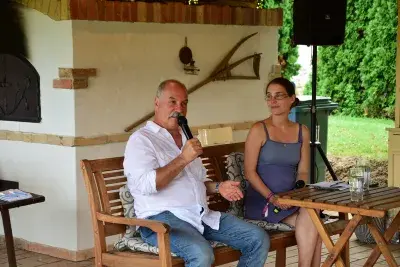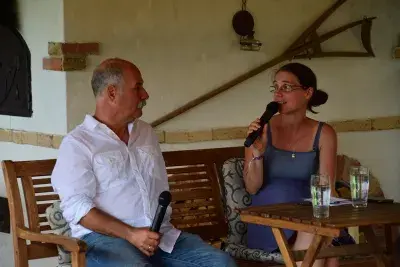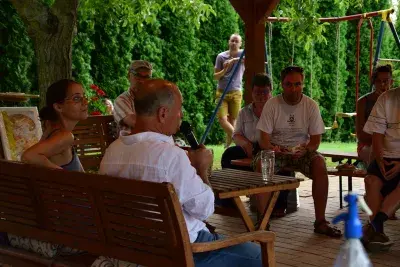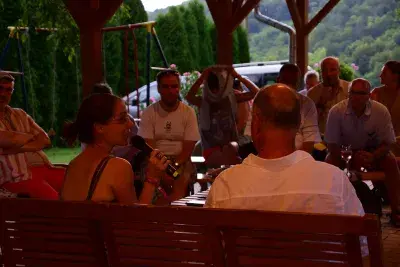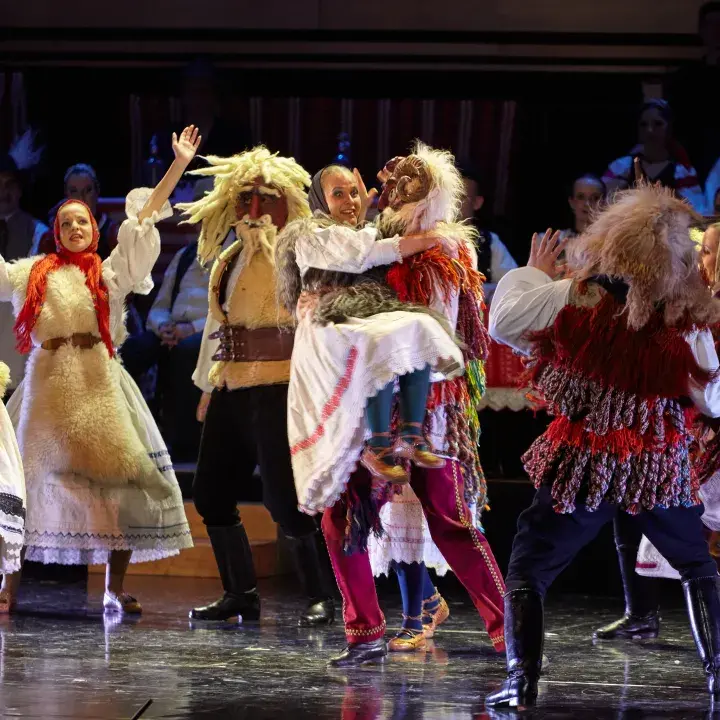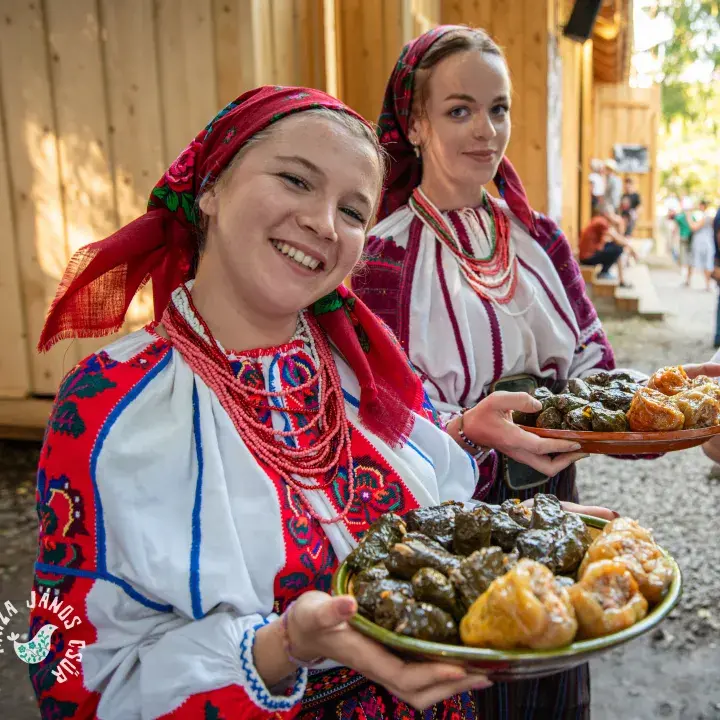Interview in Villánykövesd on August 2, 2019. | Reading Time: 27 minutes
Singer and storyteller András Berecz was the guest at the Ördögkatlan Fesztivál, held at the Free University of the Hungarian Heritage House in August 2019; he was interviewed by etnographer Angéla Hont, Head of Department at the Hungarian Heritage House. We learned how a boy from Budapest fell in love with languages and became obsessed with tales, how important tales and songs were in the rural communities, why are tales and the language preserved thereby important at all, and what might be common in Hungarian tales, Greek mythology and Shakespeare’s works.
A. H.: It is my pleasure to welcome singer and storyteller András Berecz; let’s start with a personal question. Where were You born, how did You get acquainted with the world of tales?
A.B.: I was born in Budapest, under Vadász Street 27. It’s a historical building. When I was a schoolboy, an old shoemaker always asked me, if I were going to school. He was wearing an apron, and his tools were visible from the street front. Coal was carried on wagons, and along with wood, it had to be shoveled into the basements. Icemen were using a pick to get the ice blocks off the wagons, and carried them in bags to the marketplace designed by architect Eiffel and his companions - also a historical building. With beautiful cast iron elements, bricks and sandstone. When I opened my window, I could see a boar, a veal and a carp. Our house was so small that I had to share a bed with my parents. I was an only child. My mother gave birth to me, her first and last child, at 43. And if I tried to jump off the bed, I hit my head in three directions. I couldn’t try the fourth way - that’s were the bed met the wall. All in all, it was a tiny little place - it was unimaginable for us, what we do nowadays: with my kids upstairs, I would yell at them from downstairs, and vice versa, talking about what we’re doing and other mundane stuff. We were all squeezed together, and as we never had a TV, we were listening to each other carefully. My mother was a real storyteller, as she only attended school for four years - her originality was not affected by academics. That’s why at home, I would always listen to stories about heroes and demigods of Kunhegyes, fighting at brawls or falling into wells, yet still remaining true friends. She always told stories about so interesting, such honest village people. Those were the tales of my childhood. My father came from a village of 500 inhabitants, up in the mountains of Gömör. They have always been smugglers - it was not their choosing, but they were cut off from the motherland at Trianon. They used to buy merchandise here, as their parents and grandparents did. They bought sheep or cattle in Somoskőújfalu, crossed the forest, and got back home to Sőreg, avoiding the militia on the way. The local spring wasn’t named after bandits, but smugglers; the same applied to trees or wells - that is, the term “bandit” was replaced by “smugglers” here. When my father escaped from American captivity near Munich, he walked all the way home, crossing the Russian lines next to Vienna, which was not an easy task. Three of them set out; he was the only one who made it. That was his life: he loved to run away, because he was always on the run.
A. H.: That was a tale in itself. So it was Your family that introduced You to the beautiful world of folk tradition. How did it captivate You, why did You decide this was going to be Your life?
A.B.: Maybe it was the difference - at home, we spoke a different language and used different words, than at school. My father had nothing, but the craft of language. He spoke several of them, and translated into 12 or 13. He also knew dead languages, had a good command of Latin and Greek. Among his specialties, he boasted speaking Vogul (Manysi). His pockets were always full of Landenscheit dictionaries: Czech to Portuguese, legal ones, and so on. He read and learned these just for fun. Because he loved languages so much. He was obsessed by languages as such: precise words, creative word orders, those were his passions. Using the same words, You can tell a certain story - and if You change the word order, You can express different emotions. You can also achieve a lot by latency. He was consciously controlling me. Whenever I brought something home that he did not like, he could tell in an instant. I learned and used Germanism as early as in kindergarten. I pointed one out to our teacher. She said to me: it is said so and so, to which I replied: there is a different way to say that. I was bilingual in District V of Budapest: I knew perfectly well the language and jargon used by my friends when circling Balassi Square, throwing rocks on Honvéd Square, or playing football; and at home, I switched to the language that was expected of me. I always weighed my words depending on who I was talking to. That’s how I instinctively learned about the richness and diversity of Hungarian. I still use that today. And my mother being a village person; a village woman to be precise. Whenever we would take Bus No. 7, many times I had to ask her: “Mother, please, stop staring at that person, the whole bus is looking at You staring. You can’t do that.” “But son, can’t You see that he can’t speak, he’s getting a frog.” I said: “Mother, that’s not right, he’s speaking English. English is spoken by more people than Hungarian.” “That might be so” - my mother replied - “but he’s suffering throughout.” And by the evening, she would imitate and parody the guy, making me and my father laugh our faces off. She would observe everyone who acted in a way that was different or seemed strange to her - and You could tell instantly that she would put on a show that night. You could see her eyes lighting up with inspiration; like a butterfly collector would chase around with his net, she would pick up the pieces with her eyes, and replay them in the evening. You see, it was dangerous to show strange things to her, as she would turn them into gentle ridicule and parody very quickly. They say there are people who just “rub You the wrong way”. However, in this context, “rubbing in a wrong way” is a state of mind.
A. H.: In rural communities, there were great storytellers and singers, with tales and songs constituting an integral part of society, the village community and the lives of people. When did You tell stories and sing songs?
A.B.: We can approach this from many perspectives, in order to reach a correct answer. As time would pass by and we would start running towards civilization, we gradually had less of both time and civilization. In a well-organized village, everyone would know a tale or two. But there would always be one out of hundreds or thousands who would know these better than others. Almost everyone knew a song or two; but there would always be those out of hundreds or thousands who would be better singers. For instance, Uncle Hazug Pista (István Köllő, 1931-2016) from Gyergyófalu. In Kyrgyz and Kazakh societies, these people would be called akins. They were singers-storytellers for life, or, to be more precise, their life predestined them for this. Their talent led them in this direction, and they learned the many tales and songs during the process. They could express a nation’s feelings in a song. They rode horseback to weddings and funerals; there, You would find the cross-section of a nation in such a 30-40 year old person. You could hear the ethics of Kyrgyz or Kazakh society as he would speak. The code of ethics could also be found in the tales about Mátyás király (Matthias Corvinus). We may learn from them that the proud Hungarian folk does not like to be ruled and dominated; however, there are authorities they would tolerate. Now these singers and storytellers, who would roam these huge territories horseback, did not only speak, but they listened as well. Ears of singers and storytellers are perhaps their most important organs. As they used to say: people have two ears and a single tongue. So if You can’t listen twice as much as You speak, don’t bother opening Your mouth. This means that if someone is drowning in his own feeling of superiority like a fly that flew into a bowl of soup, he won’t find a way out; but if someone opens up his heart to the world, he has a lot of space to pick up things. They also say that donkey’s ears are not real, they must be attached. I have also witnessed that great singers also have great ears. They could listen to others, and adapt the lines to their own life experience. They could also modify the tune a little, let everyone know that this is their rendition. Nowadays, there aren’t as many tales told or songs sung. In urban communities, people are afraid of what their neighbors would say. And so they would only hum quietly. They can hear the tune in their heads loud and clear, but when they open their mouths to speak, something completely different comes out. They try and say: “that’s not right - I should probably stay quiet”. And so they become people who stay silent and hum away in the shower forever. On the contrary, in rural communities, there was always an altogether during festive occasions. You couldn’t explain yourself there by saying “oh well, I don’t have a sense of that”. If you sing together with others from early childhood, it fixes your voice. Low tunes become higher, and vice versa. And suddenly, you become a good singer. Communities are able to do this magic to you. Folk that always sing together don’t have a single false voice among them. Whereas people who become isolated and disperse are afraid to sing out. They claim that they have no gift for music. I always respond: enough of that! Get yourself together and start again, because you miss out on so much greatness. People usually miss out on the very best of things so easily. Singing together is one of the best kinds of human connections. When doing that, time flies to fast, and people become happy and relieved.
A. H.: Is it safe to say that in rural Hungarian societies, tales are mostly a thing of the community, whereas singing is more of an individual matter? Tales involve a storyteller and the audience, but singing does not necessarily require the same.
A.B.: It’s true that people do not usually tell tales to themselves. However, I actually do that sometimes as well. Even the best storytellers need to dust off those many tales while alone. People who spend all their time with tales are like treasurers. They might have a pot of gold, but it requires constant attention. It needs to be moved left and right; and with tales, you start forgetting certain parts here or there. You might think: “this part is not clear to me, why does that character do that?” That’s when I start thinking about it, and polish it to perfection. You can’t see it, but storytellers are telling their stories on the inside, just like singers are replaying the tune in their heads. One more story about that. The best storytellers I have ever met were all loners. I think that they had to isolate themselves to preserve their state of mind; just like Uncle Hazug Pista had to live fifteen kilometers outside the village. And there, all by himself and away from everyone, he put all the pieces together. When alone, crafts take flight, get a new perspective - they ripe, just as grapes do in a barrel. There is no comparison between a fine wine and a grape juice. It’s not the same. As it ripes, it becomes unique. Why are the songs of rural people so interesting? They sound one way in the spring, and by fall, it gets a new meaning. A twist here and an addition there. I once recorded an argument between Uncle Mihály Czirják, a shepherd, and his wife. The wife said: “I’d keep You on a leash, like You do with Your dogs, for You to sound the same. We have folk from Budapest coming down here, and You keep mixing it all up. You’re a disgrace to singing.” Mihály listened to her, and said: “Shut your piehole, woman, this instant. Singing is all about showing who you truly are, express yourself through the melody. That you’ve been here and there, and felt like this and that.” Freedom and order started to quarrel in front of me. The man represented freedom, and the woman symbolized the order. The woman portrayed the village community, and the man stood for the freedom of the grasslands. He found his own tune in the skies above. Rasul Hanzat was a great singer in the Caucasians; he later became a poet. As he was laying in his garden, looking at the skies above, his wife called for him for the third time, asking him to have lunch at last. That’s when he jumped to his feet and said: “Can’t You see I’m working?” The wife got scared and ran back, saying: “Well, you can starve then, for all I care!” As You can see, poetry is also a lonely business. Once a poem is put to perfection, only then you can bring it to the people.
A. H.: Sticks and carrots of the community, am I right?
A.B.: Indeed.
A. H.: So the community also has an impact on tales.
A.B.: Very much so. Storytelling, which is old as times, has an advantage of being polished by so many people listening to them. It’s an immense advantage. For instance, it’s smart in a comprehensible way. Nowadays, it’s not the same: smart people usually talk in a too complex way, and they even brag about being way too sophisticated. They are so happy to use new phrases that poor students do not understand; but they start to feel like they need to follow this road, so they start to use these incomprehensible phrases too. That doesn’t mean they are talking nonsense, but they hide behind the cloud of mystery. Tales are smart, yet easy to understand. Moreover, tales are proportionate. If the storyteller tells his tales to many people, he will start to notice disproportions. If someone makes a loud entrance, he draws all the attention. This is very challenging to a storyteller; I’m not offended by that, I just try to draw conclusions. I say unimportant things until their heads turn back again, and stop paying attention to the door that opened. It’s like doing construction on the Basilica, putting the corbel into the dome, and someone kicks the ladder away. You can start again. Now if someone is offended by that, he should not be a storyteller. You can only do this with all the cheer in the world. When someone talks, he will notice that not all of the audience pays the same attention, as life keeps going on. Tales are not constant: at certain parts, everyone just stares away, and during other moments, the audience gets really involved, forgets about household items or keeping two sets of books. The storyteller usually tries to push that part, because he feels the power of connection, which would be stupid to throw away. However, sometimes the latter part may be told over and over again, and the audience does not get as excited as I do. Maybe because it isn’t exciting at all, or perhaps I failed to convey the story properly. If a story keeps evolving over centuries, it can reach wonderful heights. Tales are also amazing due to the fact that storytellers sometimes do not even understand what they are saying. They are able to pass it on to others, who might be able to understand. Experience, wisdom and beauty are wrapped in the story, and as they unravel, they make people better. Abstract thinking gets into a tough spot, as once you have said something out loud, you need to explain and define your every word, and in the process, you can lose the attention of people. That’s why philosophers and the likes are sentenced to remain in their inner circles, and find it hard to expand towards others. Tales are philosopical, ethical and aesthetical in a way that also makes them suitable for everyone.
A. H.: Tales were usually told during time off, or when people were busy doing manual work. During long nights of shredding in the shed, or hulling, before harvest or goinf to sleep, perhaps among shepherds to kill time. What was the purpose of such tales? What did the audience take away? Why was it important for them to be told?
A.B.: Usually, and most importantly, tales make sad people happy, or give self-absorbed ones a reality check. We should stress here that tales were always meant to serve a purpose. There are very few tales that do not resemble lives, struggles or love. That’s their primary purpose. There are many spheres within a tale; there are certain ones which are a theory in themselves. There are ones that explain everything possible. Characters from this world are sent flying to the stars above - children have an easier way to understand that, as those stars represent stories from this world. We know so many tales that offer us guidance. Some of them offer us a lesson in the art of love. Young people need to be prepared for love, as it is a battlefield. There are tales that celebrate languages. Words that are not true are being spoken, and yet, you can believe them. Impossible stories are told as bragging, and you want to see them come true. So when Uncle Hazug Pista says that droughts were so severe that fish have turned three, yet they did not learn to swim, that’s when people start to imagine, what if...and it’s so nice to believe; even though it’s all just made up. And then he goes on to say that God himself brought down such torrential rain and floods that mice were catching fish on the attic. You get that? You don’t believe it, but why shouldn’t you, when believing in impossible could bring You such great joy? You would be a fool not to be fooled...So those are tales where language and spoken words create small images of a certain kind, and keep twisting around. Twisting around in a beautiful dance. These are the so-called “blunt tales” of János Háry and the likes; even among these, there is an endless variety. To me, the best story of Uncle Pista is the one about returning from Russian captivity in Siberia. The character returned after losing a leg, only to find a home with nobody to welcome him. And then they asked him about what happened. And instead of complaining, he would burst into silly stories.
Uncle Hazug Pista was even talking in tales. He said that he liked floods, as they always brough with them something new. Once, he claimed, the flood brought him one yellow rubber boot; and despite having to wait for the other pair for three days, only to get a green one that time, all in all, he had shoes on both his feet in the end. That’s why he turned to God and said: Lord, giveth me floods again, for I can dress myself completely.
A. H.: Are there functional differences between tales of the past and those told today?
A.B.: The world has changed a lot, occasions are different today. But all in all, I believe that tales are still capable of the same effect. Whatever the way people become, as long as they are born through childbirth and leave this world through death, they can get answers to all essential questions of existence from tales. But occasions change. For instance, the circumstances surrounding the storyteller. I never would have thought to be invited to a butcher’s festival in the afternoon. Neither me, nor the person inviting me realized that at such festival, there isn’t a single sober person as early as morning. Now, I had to begin at six in the afternoon, and by that time, everybody was stinking drunk. In a normal society, when there is no audience, we don’t tell stories. But I travelled three hundred kilometers from my home! I couldn’t make a scene, so I told the story to myself. These are scenes from our age. On a different occasion, a document of the ages, a communicational dead end was beautiful in itself. I was invited to a town hall to tell a story during lunch. I was already alarmed by this, but as the invitation was so kind, I ended up going. There was an open buffet in the courtyard, a roasted pig in the middle with lemon stuck in its mouth; I had to stand over that. And they said that there are two hundred journalists waiting, they will soon come through the doors, they were listening to lectures from half past eight until half past noon, and as they would be having lunch now, I should tell them a nice little tale. That’s when I said: hold on a minute, I’m going home, this does not make any sense. Andriskám, please don’t make a scene. Alright, I said, I won’t. Let’s see what I can do. The doors flew open, the audience and the journalists starting pouring in, with me standing over the pig’s head. Everyone turned on their phones, and I was told to begin. I started telling my miserable little tale. They though I was crazy, that I have lost it. They grabbed a bite to eat, with mayo and ketchup dripping from their mouth. As I was telling my story, they started chatting among themselves, once they got used to the scene. There was not a single person out of the two hundred paying attention to me. I could understand them. In order to keep the peace - not with them, but with myself and my craft - I turned my back to them, and while turned away, I told myself my most favourite tale, which is twenty minutes long, and the one I like telling inside me as well. It was then when I suddenly became interesting - they started to think it was an avantgarde performance, despite the fact that me turning around was a functional measure, in order to keep me from losing it and causing a scene. While turned away, I was facing a firewall, with ivy running alongside and butterflies dancing around - now these butterflies, they clapped along with a thousand wings. And for that silent applause, it was worth turning away. Even the most beautiful and important words in the world depend on timing; they have to be said, when the moment is right, otherwise, we need to let go. I could go on and on about my humiliating or beautiful failures; they are just as valuable as my achievements, because they are all incredible. After such experience, I might lose interest in my profession for a week, but once that passes, my passion returns stronger than ever. What doesn’t kill you, makes you stronger, as we know.
A. H.: What do You think about the old phrases and melodies preserved in tales and songs, what do those mean to people nowadays?
A.B.: They are of infinite importance, it is not possible to count them. Speaking of phrases, let’s think about how every two weeks, another language becomes dead in this world. Every two weeks, a language is gone. Every language has a unique and irreplaceable logic. For instance, Tuvan is spoken by 250,000 people. It’s a language from the Altai Turkic language family, spoken in Southern Siberia. When speaking of the past, they say it’s in front of them, while the future is behind them. That’s their strategy, and it has a peculiar logic: since they know, what happened in the past, that’s the direction they are facing. Whereas we don’t know what the future holds, so it must be behind their back. That’s the construction of their language. It’s an endangered language - if it dies, who will represent this curious logic in the world? No one will. Similarly, there is irreplaceable beauty to Hungarian language and logic that cannot be found elsewhere. And we are the only ones who can preserve these. Certain species of animals and plants are protected in national parks, as their absence would lead to an ecological crisis. The national park for Hungarian - or languages in general - is represented by tales. The things I cannot say using ordinary language in the grocery store, as there’s not enough time, people would think I’ve lost my mind, and the cashier would be upset - I can express these things through tales. I keep myself up-to-date, I understand the language of codes, and I feel at home in a certain culture. That’s what tales and the phrases in them try to convey. Moreover, tales always celebrate life.
A. H.: You have worked on many topics throughout Your career - just to mention a few: Chuvash songs, Shakespeare or the Greek mythology. How does all that come together?
A.B.: Well, I’m really fascinated by the Ancient Greeks at the moment; I don’t know when I would be able to move on, as I would like to do so many other things as well. It’s so interesting how people become obsessed with certain topics. I first started working with the Greeks forty years ago. I was a long-haired, scruffy tourist with a ponytail, carrying a backpack and taking a walk around the Turkish neighborhood in Thessaloniki; that’s when Uncle Jorgos and his wife noticed me, as there was something instinctively different about me. They have not seen many Hungarians in that area at that time. They asked me: who am I, where am I from? I said: I’m Hungarian. Oh, Puskás! The whole street gathered: everyone brought food and drinks. Soon enough, my head was spinning. As bedtime approached, Uncle Jorgos and his wife sent all the guests away, and something happened. As elders, they went to sleep in a small bed outside, while they made the large bed inside the bedroom for me, the one they would usually sleep in. Before they gave me a nightgown - red silk pyjamas that belonged to the pop -, they washed my hair carefully, and Uncle Jorgos produced a comb with a long handle. He split my hair in two along the middle line, with my skin forming a clear white dividing line. They said to me: “Andreas, until now, You looked like an American hippie; now, You look like a gorgeous Greek boy. You are one of us, son, one of us.” They put me to bed, where my thoughts started to race. Who am I, what am I doing here, who are these people, what’s happening to me, how is this world, where do I belong, why? Don’t they have a son? Why me?... That’s when I decided to focus on the Greeks. Recently, I have been telling stories from Greek mythology like a Hungarian tale. I have stumbled across wonderful phonographic recordings from Istanbul, recorded in 1950, told by a Middle Eastern Greek, an analphabetic dockyard worker from Vurla. They are all incredible melodies. I came across them with my Hungarian ears, and when I show them at the institute of the Music Academy, everybody was blown away. Many of them are pentatonic, suitable to be play on a Somogy flute. I did not have time to examine how these infiltrated the Greek world of melodies. But in my new show, ancient Greek folk songs and mythology come together in a certain order. I have to note that the Lord has a sense of humour: when someone focuses on a certain topic, he gives them reassurance - well, at least that’s what he has done to me. Because when I was consumed by the Dodecanese dialect, Rhodes and Lesbos, a friend of my asked me to help a Moldavian Csango boy get a job, who has no money. I said: well, I don’t have money either, but if the paints my rusty fences, there might be some for him. As he was painting my fence green, I asked the lad where he was from. He came from Külsőrekecsin. And where do You live, I asked him. Well, in Greece really. Where in Greece? The island of Lesvos. How many years have You been living there? Fifteen years; he just returned a week ago, and he speaks Greek better than Hungarian. So a Moldavian Csango boy called Gyurika was reading out the lyrics of Greek songs to me, as he knew the correct pronounciations. And I fell in love with Greek language, like a fly dropped into a bowl of soup; and I can’t find my way out ever since.
A. H.: Our time is drawing to an end - if there are any questions, You may ask them now.
Lady from the audience: In the beginning, You’ve mentioned people of harsh fate. Who are these people?
A.B.: In Nagykunság, children of harsh fate were those without parents, raised by shepherds or barmaids from early childhood. Sándor Szűcs collected stories of such people; including the famous bagpiper, Márton Tulok Balogh. He was of unknown origin. There wasn’t a family grave kept in order. These people were ofter buried by being placed in an old boat, covered in straw and rush, kicked away into the stream, and eaten by the wildlife. Down at the Alföld, there were many harsh lives; these are virtually unknown, they don’t have a devoted literature. (I recommend the works of Sándor Szűcs: he recorded the historical life in so-called Háromföld, regions of Sárrét, Nagykunság and Hajdúság.) People of harsh fate were tossed around by the wind and learned about life the hard way. I would also like to share something about Márton Tulok Balogh. At 99, they predicted he would still be dancing next year. And he did. He blew into his bagpipe, hanged it on a hook, and it was still producing a sound. And then, at the age of 100, he joined the dance. Some people said: for a 100-year-old, he’s got boots sewn by a hundred needles. What does that mean? This sentence has such a Hungarian logic, it is worth examining it. Hundred needles aren’t that long; if You placed them next to each other, You’d think: this old man spent all his life in the same place. But if You think about it, when a boot lasts for hundred years, and there was a boot made by every needle in every year, boots sewn by a hundred needles represent his hundred years of age. They exaggerate and go overboard on purpose. These people hate forming simple and clear thoughts. West of the Elbe, people don’t understand the thought behind it... Despite the fact that it is one of the finest moments in a language, when You have to realize that the speaker is joking. So You say something in a serious way, that’s not true, but the audience needs to realize that. East of the Elbe, it’s a way of humour and kindness; west of it, people might be insulted. I don’t have time for that, You’re a fool, You’re wasting my time. But that can also be beneficial: in such a concise world, there is a concise society, where the museum opening at 10AM truly opens at ten. And You’re late at 6:01PM, as it closes at six. While in the world of sassy wives, a 10AM opening might very well happen at 11. And I can confirm that if You’re good-looking, they might open at 8 for You and let You have the collection. Let’s examine the second part of the statement now. He’s got boots sewn by a hundred needles. That’s Hungarian thinking again. He does not say that he has quick feet, as the speaker hate direct compliments; he uses a coy phrase. But he means that those boots are fast ones. And that the old man put them on by mistake. Let the audience realize the meaning. In national parks for languages, we can preserve sentences of incredible beauty. They are like pieces of art, or pearls in the ocean. You pick them up, take a look, try to identify the logic, how it resembles the world, and then You say: this is made of volatile material, as it consists of syllables, yet it is also a piece of art. Let’s take a look at the word “kasmatolni” (to roam around). I consider that a piece of art as well. It it used in the Udvarhely region to describe a person doing nothing. When the boss comes around, he imitates work by lifting something with great effort, then leaving it exactly in place. He roams around. He does nothing. On the other hand, words with several meanings might also be dangerous, even though poetry likes those a lot. But not only words can have a plurality of meanings: so may movement. I know Balkanic musicians, who have toured with us in the West: they were able to shake their heads in a way that puts bobbleheads in cars to shame. And they could bat their eyes at the Dutch boss, making him think he was God himself. Only to share a look afterwards, with a lot of resentment towards him. And there are so many other meanings of things to be explored! The most delicate moves, shades and intonations...if You develop a taste for that, You’ll start to crave those.
Gentleman from the audience: I have a question about my four-year-old. He watches a lot of tales and we read a lot to him. Hungarian tales, Dani Varró and Judit Berg appear alongside Thunder McQueen, Walt Disney and Harry Potter. We read two Harry Potter books to him, and he watched the first two several times. We have been criticized a lot for showing that to him. At bedtime, there is always a prayer for children and adults. A couple weeks ago, when I said the prayer for adults, he started chanting: “let us be free from the dog with three heads, trolls and Voldemort, forever and ever. Amen.” My wife and I thought to ourselves: well, he should not be watching Harry Potter after all. My question is: should we expose a four-year-old to Harry Potter? I think it’s also a tale and I like showing it to him. I’m curious about Your opinion on the matter.
A.B.: I can’t give You a recipe or any advice. If You like it, and You also love Your child, You pass it on. People pass on what they love. I can tell You my thoughts about the phenomenon. You’ve got a wonderful child who can adjust a prayer freely as he did; I believe that’s magical in the relationship between parents and children, when the soul of that little child suddenly bursts out. I also have a similar story to share. My son István was teaching one of his cousins how to pray before meals. He said: Lord, join us at our feast, bless our food. Now, his cousin, Gáborka, had an old dog who passed away. He was buried by the fence, with his grave marked by a cross from small rocks. And he knew one prayer, which he would say: Lord, join us at our feast, bless our food. Over the dog’s grave. Adults are always baffled by kids who explore a whole new world, and sometimes, they do it with such beauty that we are left speechless. Dani runs a fever, because he ate some snow. How would someone run a fever because of eating snow? How perfect is that? As I’m obsessed by languages, and the beauty, versatility and richness of Hungarian language and logic, I have only tried to introduce my children to Hungarian folk songs and tales. When we ran out of those, we moved on to tales of different folk, then Ervin Lázár, followed by world literature, but I always believed that until a native language is in development, those characters and phrases that we know should be passed on to kids, as we are the only ones who can preserve them. After that, the world is their oyster; but I want to build a haven and erect a lighthouse for them, so they can go anywhere in the world, but always have a safe place to return to. In culture and feelings, the sense of home is also very important. Parents pass down things they love to their children; and then they find themselves. I thought that I should form their mentality through Hungarian tales for as long as I can, for the world is running towards emptiness in a rapid pace. Original colours are challenged by time and the crowds. Languages disappear, and it’s not enough to say that I’m bothered by that. I feel like I should stand by them, like I would cheer a boxer who’s been knocked down. As a guest prepares to leave, I want to take a look in their face, as I don’t know if I’ll ever see him or her again. Farewells are important to me. And I see the world saying farewell to these small languages. Anglo-Saxon, Mandarin and Arabic languages are dominating over and destroying these little dialects. Despite the fact that they are not superior. There are phrases lost which are not inferior, but only because they are not accessible to people who simply do not have the time to find them. Behind every word, there is an observation. I value each and every language that I have acquainted. I like English a lot, as it can express important things using only a few words. I love the English of Shakespeare to the moon and back; at the same time, I also love the endless highways around Detroit, and a banner on a house saying in huge letters only this: Think. That’s it. Think! That’s so Anglo-Saxon and American that, for instance, I could not do that. Why is it up there in such large letters? For what reason? Yet we feel that it’s right. On the other hand, when I take Shakespeare to Csík, and I say to them: listen up, buddy, I can see that Your nose has more brains than Your skull, they would think I got that from a friend at the local inn. Even though it was said by old Sir William Shakespeare himself. Another quote from him: there were no nails on your grandfather’s toes when your mind was already clouded by sour mold. The images of rotten and sour represent a life without thinking. That’s the meaning that connect the granfather’s toes to mold. To sour mold. Mold is only mold, until it gets sour...You see, these are not just word that were spoken out, but You feel that there was someone before You, who has seen and observed something, and used his brain to put it into a phrase.
A. H.: Dear András, we could listen to You all day long - and as You can see, the storm passed by as we were listening to You. Thank You for the valuable lessons, nice words and heartfelt laughs.

